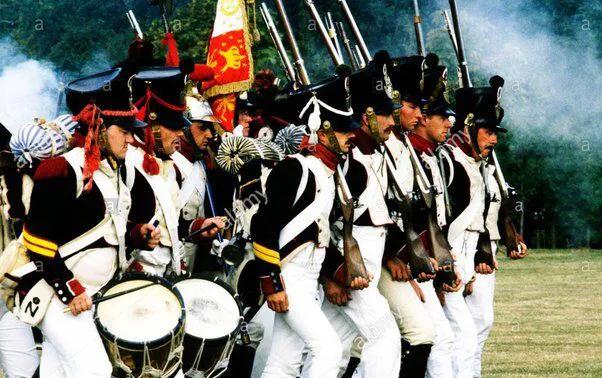When a real man stands in front of an entire heavily armed army with open arms, daring to hand his fate into the hands of his people, he will only reap the cheers of all and put him on the throne of the emperor.
One day in February 1815, a group of soldiers in blue uniforms carrying muskets and bayonets marched in a line on the outskirts of the town of Grenoble in southern France, neatly lined up and with serious expressions, on a mission to capture someone. A knight appeared on the distant horizon, approaching the troops at full speed.
When the rider approached, the delicate but somewhat worn-out clothes, the dangling medals, the beautiful hat and the white horse under him were enough for everyone to identify him.
When the man was close enough, the soldiers in the front row had seen his face clearly, and although his riding posture looked a little towering and stiff, when the sunken and deep eyes swept through the troops, everyone was impressed by the man's majesty and demeanor.
This man was the man they were going to capture and execute, but when the man got off his horse, he didn't have any bodyguards by his side. But no one shot.
When he stretched out his arms and walked toward them, it was as if they had seen the Lord on the cross, and he had come to save them from their suffering, to take them back to glory, and to make France great again.
The silence around them could not hear any sound, even the birds, the wind and the rustling of trees disappeared, and did not dare to break the silence of this moment.
"Kill your emperor, if you will." The man shouted at them.
All the soldiers stood where they were, still staring nervously at the small man in front of them.
Finally, a man in the queue shouted out: "Long live the emperor!" ”
Everyone rushed to join in, and soon only the real army was shouting for the emperor. An old lieutenant stepped forward from the legion, prostrated himself at the man's feet, and kissed his hand. Amid the endless cheers, the army began to march in the opposite direction toward Paris, and the French tricolor flag was raised again in the queue. For France, this heralded the return of freedom, equality, and fraternity to the kingdom.
Napoleon could fight fifteen years of war with all of Europe, and when he lost the war, he could still return from exile. And immediately gained the trust and support of the soldiers. A time of return to glory. Even though, in a short period of a year, the hopeless situation was exiled to the island, he knew that his place in the hearts of the French people would not be taken away by any humiliation, defeat or denigration.
I think years from now, when this man looks out to France on an island in the middle of the Atlantic, he must remember that exciting moment.
